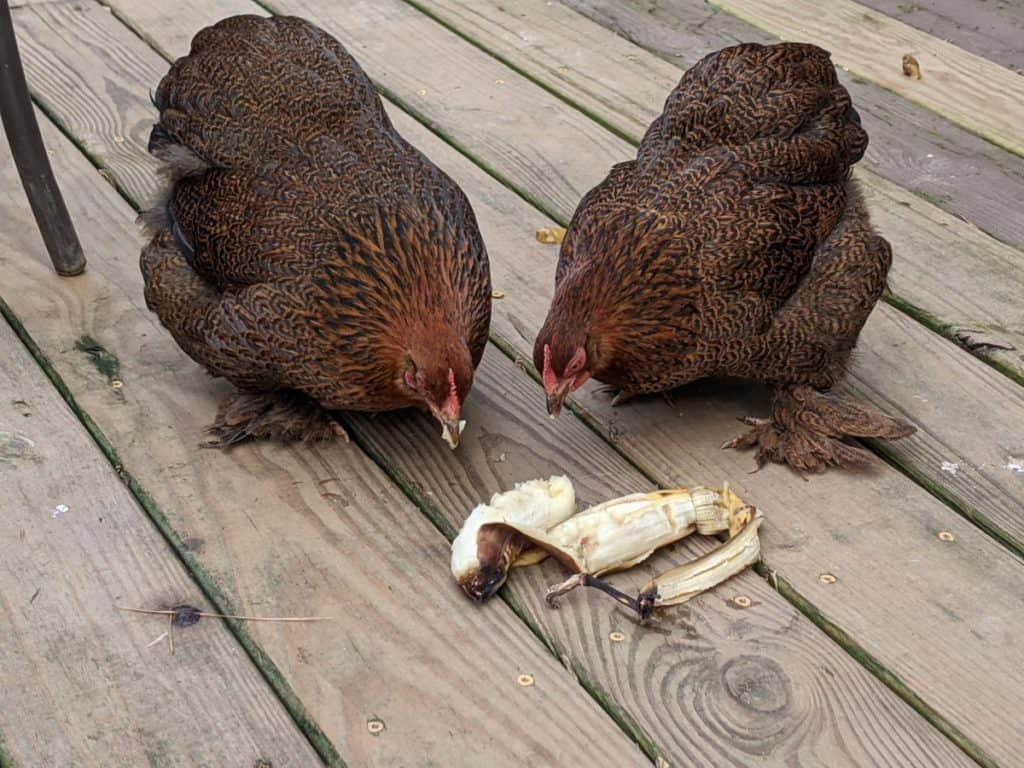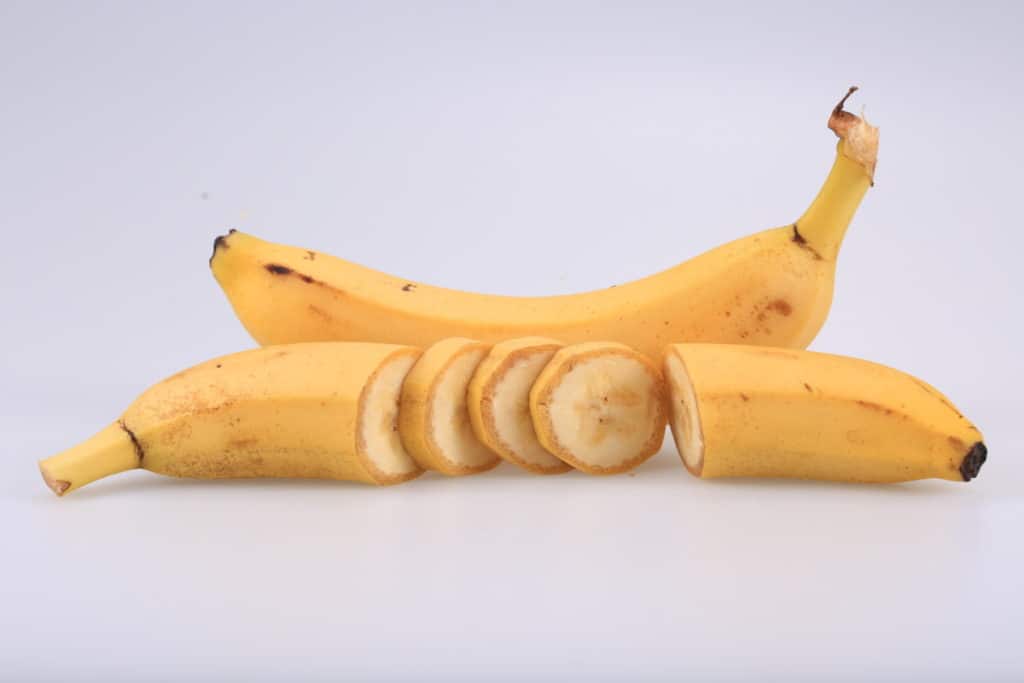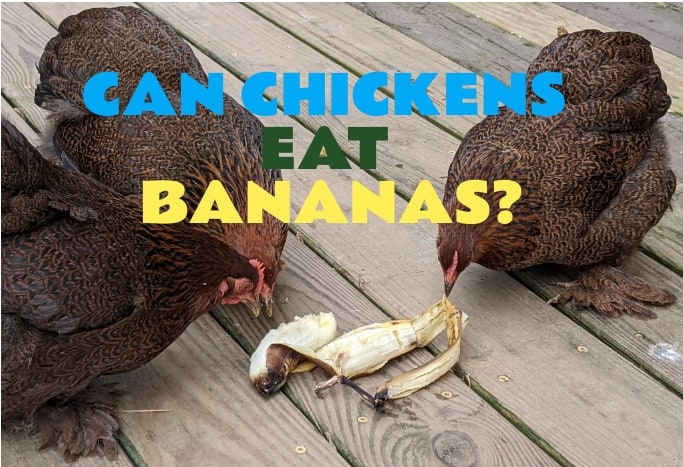
I always seem to end up with a ripe banana or two that has not been eaten and is starting to turn brown. My daughter will only each fresh bananas straight from the grocery store.
Once the peel starts to blacken and brown she wants nothing to do with the overripe banana. Lucky my chickens go crazy for overripe bananas.
Can chickens eat bananas? Absolutely!, chickens can be fed the banana flesh and peels. Bananas are a part of the Musaceae (order Zingiberales) family of plants. Bananas are rich in potassium, vitamin B6, and vitamin C. Bananas should only be fed to chickens in small amounts.
Are Bananas Good For Chickens?
Yes, feeding your backyard chickens ripe bananas has health benefits. The benefits of bananas include several helpful minerals and vitamins. These nutrients are beneficial to chickens including making them more productive egg layers and boosting their overall health profile.
The nutrients include potassium, magnesium, copper, manganese, vitamin B6, folate, fiber, and protein making them great chicken treats.
I should stress most of these vitamins and minerals are found in a good layer feed so feeding your chickens bananas is not a requirement but they do make for a healthy treat.
- Banana’s are a great source of Potassium: According to the NRC (1994) laying hens require 150 mg per day. Researchers found giving laying hens a potassium chloride (KCl) supplementation reduced heat stress and helped maintain egg production in hot weather. Potassium also helped increase water uptake in the laying hens according to the study.
- Banana’s are a source Magnesium: Magnesium is an essential function in cell metabolism and bone development in chickens. Having chickens deficient in magnesium is rare as chicken feed is rich in magnesium. Newly hatched baby chicks require magnesium when they hatch. Without the mineral in their diet, they will die quickly.
- Banana’s are a souce of Copper: Copper supplementation is used to increase the growth of broiler chickens and decreases their overall cholesterol. Bananas contain .078 mg of copper per 100g of banana. Lack of copper can also lead to anemia in chickens.
- Banana’s are rich in Manganese: Chickens require manganese in their diet for development and reproduction. A lack of manganese produces thin-shelled eggs and poor hatch ability in mature birds according to the Merck manual. Manganese deficiency is also a potential cause of chondrodystrophy and perosis in chickens.
- Banana’s contain Vitamin B6: Chickens need vitamin B6 in their diet to maintain a healthy appetite. Without B6 chickens can develop chondrodystrophy (a skeletal disorder) and also exhibit nervous behavior. A lack of Vitamin B6 can also lead to anemia in chickens.
- Banana’s Have Vitamin B12: Without the right amount of B12 chickens can develop poor feathering, have reduced weight, lower feed intake, and develop nervous disorders. The ability to help with nerve function, liver and skin health, metabolic process, energy levels, and eye health is also a benefit of B12.
- Banana’s Contain Fiber: Research suggests that a chicken’s diet should contain at least 10% fiber content. Having the right amount of fiber reduces feather pecking, improves feed intake, and helps in digestibility.
- Banana’s Contain Folate: A lack of folate can lead to poor feather growth, reduced feed intake, skeletal issues, and anemia.
- Banana’s Have Protein: This is a vital nutrient in a chicken’s diet. Protein plays an important role in egg production, growth, and immunity. If your chickens are molting it is often suggested feeding them a fed with higher protein content.
You can check out my article here for high protein food ideas related to molting chickens.
Banana Nutrition Facts
One medium ripe banana contains 1 gram of protein, 28 grams of carbohydrates, 15 grams of sugar, 450 mg of potassium, 3 grams of fiber, and 110 calories.

Can Chickens Eat Banana Peels?
Yes, you can feed chickens banana peels. Banana peels are edible and contain most of the same nutrients as banana flesh such as folate, potassium, vitamin B12, and vitamin B6. You should wash the peel before feeding it to your chicken to make sure there are no chemical pesticides on it.
Another option is to boil the banana peels. This will remove any harmful chemicals and make them softer to eat. You can then cut peel up into very small pieces if you really want them to eat it.
I often read about chicken keepers chickens not eating the peel. I know my chickens will not eat the banana peels, but they will peck every bit of flesh off the peel.
I usually just toss the banana peel into my compost pile after my chickens have finished with the scraps.
Can Chickens Eat Frozen Bananas?
Yes, chickens can eat frozen bananas. The frozen bananas may need to soften a bit before you start to feed them.
As mentioned previously bananas are rich in potassium which helps increase water intake during those hot summer days. Bananas also contain vitamin C which can help chickens when they are experiencing heat stress.
My chickens like slightly frozen bananas during the hot summer months. It keeps them cool and it changes up their daily routine.
Can Baby Chickens Eat Bananas?
Yes, you can feed cut-up bananas to your baby chicks. Make sure you have given them grit for a few weeks before feeding them this type of food to be on the safe side. Mash the bananas up a bit into mushy pieces. This will make it easier for the baby chicks to consume them.
Also, baby chicks should only have small banana pieces as an occasional treat and not an overall part of their daily diet.

Are Bananas Safe For Your Chickens?
Yes, bananas are safe for your backyard chicken. Bananas have beneficial vitamins and minerals. You should only feed bananas to your chickens as a treat.
Organic bananas contain 14g of sugar on average per banana.
If you feed your chickens too much sugar it can lead to weight gain and a drop in egg production.
Should You Give Chickens Ripe Or Unripe Bananas?
Chickens can eat ripe and unripe bananas. Unripe bananas contain large amounts of starch. As the banana ripens these starches are turned into free sugars. Because of this unripe bananas contain significantly less sugar compared to ripe bananas. Making them the superior choice to feed your chickens.
Personally, I feed my chickens very ripe bananas or over-ripened bananas for the simple fact that I don’t want them to go to waste. I don’t feed my hens a lot of bananas, so I’m’ not too worried about a little extra sugar here and there.
Below is a video of my backyard chickens enjoying a banana.
What Are The Best Ways To Feed Bananas To Your Chickens?
There are many ways you can feed your chickens raw bananas. If I’m in a rush I will peel the side of the banana and lay the banana on the ground with the peel touching. This way my chickens can eat the banana flesh without getting a bunch of dirt on it.
I also like to slice up the banana into small pieces. I then feed them on a surface without too much dirt such as my back wooden deck.
You could also string the banana up near in the run splitting the banana open and let them peck at it. This has the added value of providing some entertainment as they peck the banana apart.
Another fun method is to take a frozen banana and slice it up. You then spread it out for your chickens to eat when it’s hot outside. Trust me they will love it!
Can Baby Chicks Eat Bananas?
As a one-of-a-kind treat, your baby chickens will adore bananas! There are a few things you should know before feeding them to your baby chickens: Because bananas contain a lot of sugar, it’s best to feed them to your chicks in small amounts to avoid negatively affecting their health.
Because chickens cannot digest sugar, they are fed small amounts of bananas, including peels. Otherwise, bananas are a great way to reward your growing flock.
Foods Containing Bananas You Should Not Feed Chickens
You should not feed your chickens any processed foods that contain bananas. These include banana cream pie, banana bread, and banana pudding. These processed foods are high in sugar which can decrease egg production in your laying hens.
Can Chickens Eat Bananas in Large Amounts?
You should not feed your chickens large amounts of bananas. Just give them some as an occasional treat. This advice is applicable to any kitchen scrap you may want to feed the flock.
Can You Feed Chickens Rotten Bananas?
Never feed your chickens rotting or moldy food of any kind. It can make them sick just as it would you. Throw the rotten bananas in the trash or toss them into a compost pile if you have one.
Final Thoughts
Feeding your chickens bananas is a tasty treat they will enjoy. As long as you only feed them to them occasionally the sugars contained in the bananas should not have an adverse effect on them.
Be especially careful in the number of bananas you feed baby chicks. Remember banana treats can’t replace the daily chick feed in their diet.

